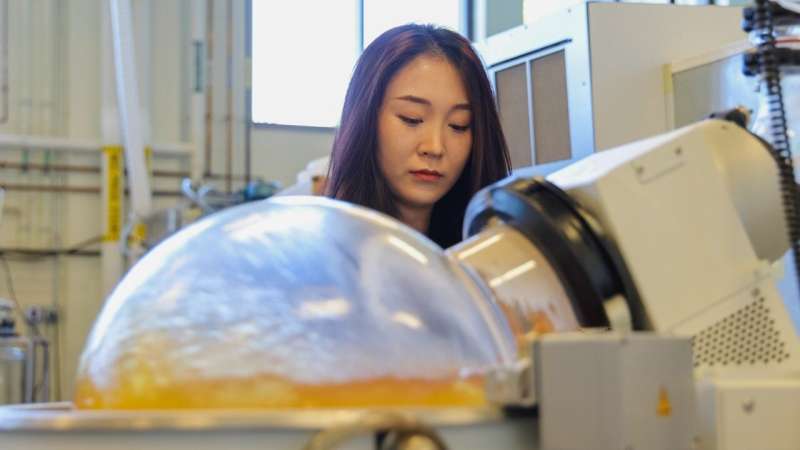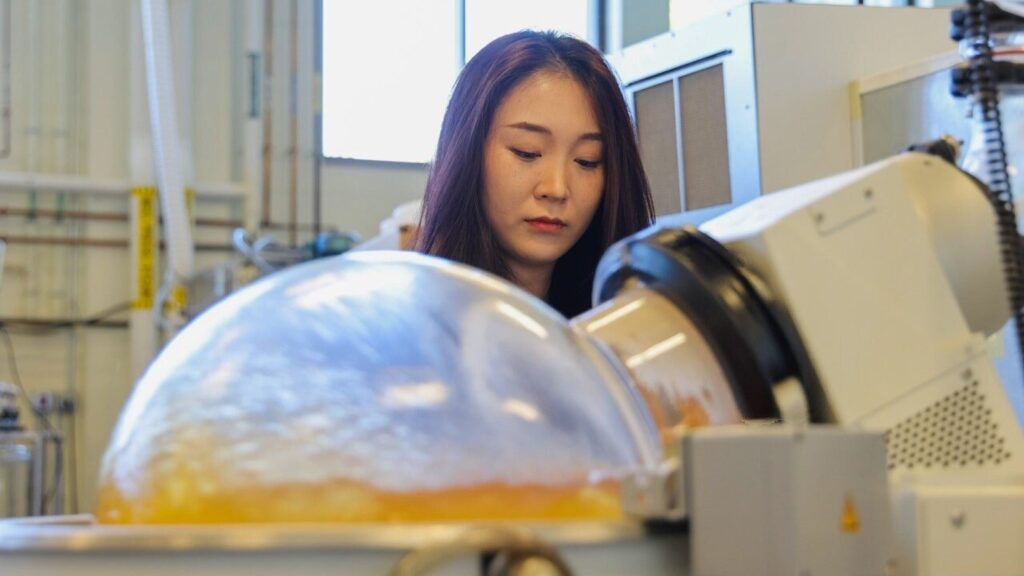
PhD student Fujunzhu Zhao works in the lab of Zhiwu “Drew” Wang, whose team is working to convert food waste into sustainable bioplastics. Photo by Luke Hayes, Virginia Tech.
Huge amounts of energy, water, and capital go into our food system, yet in the United States, 30-40% of the food we produce ends up in landfills.
What if there was a way to translate that into something we use every day?
Researchers at Virginia Tech’s College of Agriculture and Life Sciences are doing just that by developing biodegradable bioplastics from food waste, giving these materials new, useful life.
“Developing cost-effective bioplastics that degrade naturally can help reduce plastic pollution on land and in the ocean and address critical issues such as greenhouse gas emissions and economic losses associated with food waste,” said lead researcher Zhiwu “Drew” Wang, associate professor in the Department of Biological Systems Engineering and director of the Center for Applied Water Research and Innovation.
The project addresses the increasingly prevalent challenge of marine plastic pollution, with microplastics affecting nearly 88 percent of marine life, according to the World Wildlife Fund. Virginia Tech’s bioplastics biodegrade rapidly in seawater, potentially reducing the impact of pollution on marine life around the world.
This first-of-its-kind pilot project will develop and demonstrate an affordable, modular bioprocessing system for producing biodegradable bioplastics from food waste.
Researchers will use microorganisms to convert food waste into fats and process them into bioplastics. The process is similar to fermentation in microbreweries and the bioplastics produced can be easily composted, thus reducing marine pollution from microplastics. The project aims to demonstrate the feasibility and scalability of this bioprocessing system at both national and global levels.
“By developing environmentally sustainable plastics, we hope to benefit people, businesses, waste management systems and communities around the world,” said Wang, a researcher in the College of Agriculture and Life Sciences and College of Engineering.
The team will collaborate with other Virginia Tech experts, undergraduates and graduate students, including Haibo Huang from the Department of Food Science and Technology and Young Kim from the Department of Sustainable Biomaterials, and will focus on purifying polyhydroxyalkanoates (PHAs) and creating high-value bioplastic products.
“There are many ways to improve the world’s sustainability overall,” Kim said. “Currently, there are two main ways: one is to use more recycled and recyclable materials, and the other is to use biodegradable materials. The use of bioplastics is a viable option to solve the growing plastic pollution. Our approach is to improve sustainability by using biodegradable options.”
These biodegradable products contain packaging that can be composted at home and are becoming increasingly popular.
The project has been in operation for over a year now and involves student researchers who want to contribute to more sustainable packaging for the world.
“Our first step is to make a monolayer film and see if it can be used as an actual product,” said Chen Xin, senior in packaging and systems design. “If the oxygen and water vapor barrier properties and other properties are good, we can move on to the next step. We aim to replace traditional coated paper products with PHA.”
“Current paper products are often coated with polyethylene or polylactic acid, which do not fully decompose. PHAs are completely biodegradable in nature, even in backyard environments.”
Polyethylene and polylactic acid coatings are commonly found on single-use plastics such as disposable coffee mugs, the films that cover food, and even the ice cream cups we enjoy on hot summer days.
For Chloe Taylor, a fourth-year sustainable biomaterials major, participating in the project was a highlight of her college experience.
“That’s what I wanted to do in graduate school because traditional plastics are unsustainable,” Taylor says. “We want to develop bioplastics that are a viable alternative that can be used in everyday products without harming the environment.”
Courtesy of Virginia Tech
Source: Researchers work to create biodegradable bioplastics from food waste (July 8, 2024) Retrieved July 8, 2024 from https://phys.org/news/2024-07-biodegradable-bioplastics-food.html
This document is subject to copyright. It may not be reproduced without written permission, except for fair dealing for the purposes of personal study or research. The content is provided for informational purposes only.


